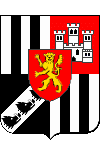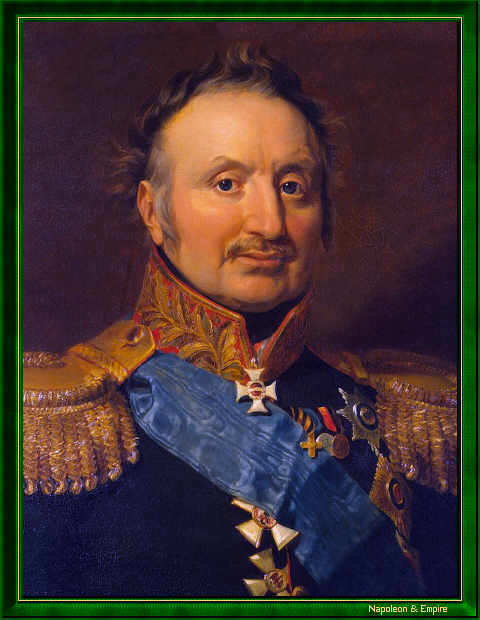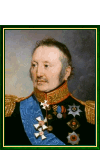Piotr Khristyanovitch Wittgenstein
Prince of Sayn-Wittgenstein-Ludwigsburg-Berleburg
Pronunciation:

Pyotr Khristyanovich Wittgenstein (Витгенштейн, Пётр Христианович) was born on January 5, 1769, in Pereslavl-Zalessky, northeast of Moscow (other sources cite the city of Nizhyn in Ukraine). His father was Count Christian Louis Casimir of Sayn-Wittgenstein-Ludwigsburg, and his mother was Amalie Ludowika Finck von Finckenstein. The entire family was of Prussian origin but had served Russia since the reign (1741–1762) of Tsarina Elizabeth Petrovna, daughter of Peter the Great.
At the age of twenty, Wittgenstein began his military career as a sergeant in the Semionovsky Bodyguard Regiment. He was promoted to cornet in 1790, then to second lieutenant in 1791. In 1793, the Ukrainian Light Cavalry Regiment welcomed him as its first major. The Polish uprising of 1794, led by Tadeusz Kościuszko, provided him with his baptism of fire, which he received as a volunteer in Wilhelm Christoforovich Derfelden's corps in Lithuania. Wittgenstein ended the year with the rank of lieutenant colonel.
He continued his rise through the ranks during the Caucasian campaigns, in which he participated from 1796 onward, initially with the Elisavetgrad Hussar Regiment. The following year, he joined first the Rostov Dragoon Regiment and then the Akhtyrsky Hussar Regiment. Wittgenstein was soon appointed colonel in 1798, then major general and commander of the Mariupol Hussar Regiment in 1799. At the beginning of 1801, he left the service, but was quickly recalled after the death of Tsar Paul I.
In 1805, Wittgenstein participated in the campaign in Germany and commanded a brigade in Peter Bagration's corps at the battle of Austerlitz. A new Russo-Turkish conflict sent him to fight in the Caucasus the following year. He returned to fight against the French in 1807 on the German-Polish border. On December 12 of that year, he was promoted to lieutenant general.
The army entrusted Wittgenstein with a corps of 9,000 light infantry, at the head of which he guarded the coast of the Gulf of Finland during the Russo-Swedish War of 1808–1809. Once hostilities ended, he remained stationed in southern Finland until 1811.
Throughout the French Invasion of Russia in 1812, Wittgenstein commanded the right wing of the Russian army. At its head, he initially managed to contain the French troops facing him. Several engagements took place between them. The first, on July 30 and August 1, at Kliastitsy, allowed him to gain the upper hand over Marshal Nicolas Oudinot's II Corps. The second took place near Polotsk on August 17 and 18, the city to which Oudinot had retreated and where he rejoined Laurent de Gouvion Saint-Cyr's VI Corps. Wounded during the battle, Oudinot yielded his position to Gouvion Saint-Cyr, who defeated Wittgenstein and earned his marshal's baton. After these two battles with contrasting results, both Gouvion and Wittgenstein remained entrenched in their positions until mid-October. Tsar Tsar Alexander I was satisfied with this and, it is said, bestowed upon his general the nickname Savior of Saint Petersburg
. The compliment seems somewhat exaggerated, for while Napoleon's left wing did indeed threaten the Russian capital, it lacked any real intention of launching a serious attack.
In October 1812, from the 18th to the 20th, another battle pitted Wittgenstein against Gouvion Saint-Cyr, again at Polotsk. This time, the Russian prevailed. As a reward, he received the rank of cavalry general. On November 14, he repeated his actions at Smoliani, this time gaining the upper hand over Marshals Claude-Victor Perrin, known as Victor, and Oudinot. His actions proved less effective in the days preceding the crossing of the Berezina River by the remnants of the French army. The erroneous information Wittgenstein possessed regarding enemy numbers—still largely overestimated by the entire Russian command—led him to excessive caution in the movement of his troops. The failure of the Russian maneuver aimed at blocking Napoleon on the left bank of the Berezina and forcing his surrender in open country was therefore partly his fault. He escaped blame, however, and took solace in the fact that he was the first to have captured an entire French division, that of General Louis Partouneaux.
The year 1813 began under the best of auspices for Wittgenstein. In January, he replaced the recently deceased Mikhail Illarionovich Golenichev-Kutuzov as commander-in-chief of the Russian army. At its head, he entered Berlin on March 7th alongside the Prussian forces of General General Ludwig Yorck von Wartenburg. The subsequent events were less glorious. Defeated at Lützen and then Bautzen, Wittgenstein was removed from his post and replaced by Mikhail Bogdanovich Barclay de Tolly. He was, however, given command of an infantry corps with which he continued the war and which saw action at the battles of Dresden and Leipzig.
In 1814, Wittgenstein's participation in the French campaign was cut short. On February 27, he was wounded in the leg during the battle of Bar-sur-Aube, which he led alongside Karl Philipp von Wrede. On March 7, he relinquished command of the VI Corps of the Allied Grande Armée, commanded by the Austrian Prince Karl Philipp zu Schwarzenberg. According to some, this resignation was due less to his health than to the resentment he felt at seeing his only Bavarian counterpart promoted to field marshal for their joint victory.
In March 1815, Napoleon's return from exile on the island of Elba recalled Peter Wittgenstein to active service. He marched back to France at the head of troops who had been stationed until then on the borders of Lithuania and Poland. Like the rest of the Russian army, he was still en route when the battle of Waterloo on June 18 and Napoleon's abdication on June 22 brought an end to hostilities.
Wittgenstein spent several months in 1816 recovering from his illness, then in May 1818 was appointed commander-in-chief of the Second Army, replacing Levin August von Bennigsen, and a member of the Council of State. On September 3, 1826, the new Tsar, Nicholas I, promoted him to the rank of Field Marshal.
Wittgenstein ended his military career during the Russo-Turkish War of 1828–1829, at the beginning of which he commanded successfully on the Danube front. In January 1829, however, he requested leave for health reasons. He received it the following month.
In May 1834, the King of Prussia granted him the title of Prince of Wittgenstein-Sayn-Berleburg, which the Tsar allowed him to use in Russia two years later.
Wittgenstein died peacefully in Lemberg [Lvov], on June 11, 1843. He is buried in the town of Camenca [Каменка], in Transnistria / Moldavia.
"Peter Wittgenstein", by George Dawe (St James's, Westminster 1781 - Kentish Town 1829).

All dates on this page are in the Gregorian calendar (eleven and then twelve days ahead of the Julian calendar in use in Russia at that time).
Other portraits
